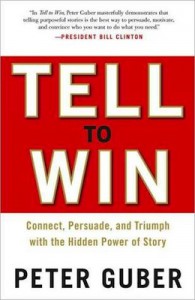Do you know the feeling of “but that’s what I’ve been saying all along, why did it take you guys so long to get it”?
I bet Jeremy Hsu, who wrote an article for the Scientific American on “Why We Love a Good Yarn” in 2008, feels that way. Judging from recent business book titles – such as Tell to Win and The Dragonfly Effect – my google alerts on “storytelling”, and Twitter’s #storytelling hash tag, you could almost get the impression that the power of storytelling is a brand-new, recently discovered miracle. Though really, it has been around for a while.
While I may have to let up on the storytelling-obsessed posts soon, I think it’s worth spending a few minutes on Hsu’s article. He, unlike most others, dives a little deeper into why it is that we all respond so positively to stories.
He argues that storytelling is a universal human trait that has always served as a way to practice, form, and strengthen social relationships between people. We, as human beings, have learned how to interact with each other, how to show empathy and interpret emotions, through stories. In fact, Hsu says, scientists are beginning to agree that
“Stories have such a powerful and universal appeal that the neurological roots of both telling tales and enjoying them are probably tied to crucial parts of our social cognition.”
However, Hsu doesn’t get much further into the details of these cognitive aspects of storytelling. If you want to continue to explore the subject I recommend turning to Austrian-born Monika Fludernik, who is a professor of English literature and culture at the Albert Ludwigs University of Freiburg, Germany. Her research is academic (and perhaps only for nerds). In 1996, she wrote Towards a Natural Narratology wherein she precisely approaches narratology, storytelling, as cognition. She reasons that stories are meaningful because listeners will connect the stories they hear to life experiences:
“Unlike the traditional models of narratology, narrativity […] is here constituted by what I call experientiality, namely the quasi-mimetic evocation of ‘real life experience’.” (Fludernik, 1996).
In essence, Fludernik supports the view that Hsu is highlighting: Storytelling is tightly connected to human cognition and the way in which we think about the world.
The practically applicable conclusion from Hsu’s writing is, of course, this:
“[S]tories have a unique power to persuade and motivate, because they appeal to our emotions and capacity for empathy.”
It is no coincidence that marketers, advertisers, managers, and so many others have success with using storytelling in their communication – even if they are just beginning to discover this. It will continue to be true that we as people are preconditioned to respond to storytelling, to feel persuaded, motivated, and to change.
